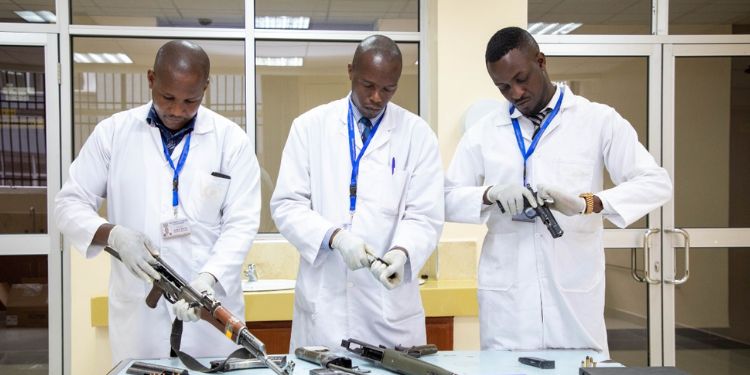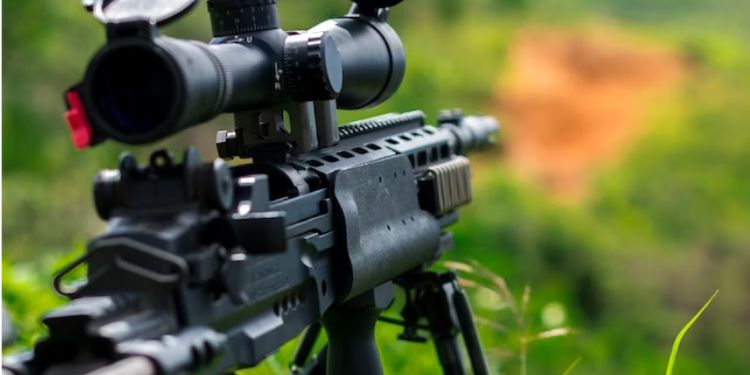Firearm ownership in Kenya is highly regulated, and the process can be lengthy, expensive.
The application process is strictly controlled by the Firearms Licensing Board (FLB) under the National Police Service.
To legally own a firearm, applicants must meet strict eligibility requirements, submit several documents, and undergo background checks and training.
Firearm regulations are designed to ensure public safety and prevent misuse.
Therefore, licensing ensures that firearms are only available to vetted individuals with legitimate reasons for ownership. Also, the system ensures accountability through background checks, interviews, and monitoring.
This guide breaks down everything you need to know about applying for a firearm license in Kenya.
Also Read: 7 People Who Stole Guns During Gen Z Protests Arrested
Types of Firearm Licenses in Kenya and Eligibility for License
Kenya issues different types of firearm licenses depending on the intended use, and each license comes with conditions on the type of firearm and purpose of use.
- Self-Defense License – for personal protection, usually restricted to handguns.
- Hunting License – for regulated hunting, covering specific rifles.
- Sport Shooting License – for competitive shooting sports.
- Private Security License – for licensed security personnel and companies.
To qualify for a firearm license, applicants must be Kenyan citizens aged 21 or above.
Additionally, the must have a clean criminal record, verified through DCI background checks.
Also, they ought to provide a psychiatric and medical report from an authorized government hospital and show financial stability (bank statements, payslips, or proof of employment).
Applicants also provide a valid reason for ownership (e.g., security risk, profession) and submit recommendation letters from reputable individuals or employers.
Step-by-Step Application Process
Step 1: Obtain the Application Form
Get the application form from the Firearms Licensing Board (FLB) office or download it from the e-Citizen website. Fill it accurately.
Step 2: Prepare the Required Documents
- Valid ID or passport
- Certificate of good conduct (DCI)
- Proof of residence (utility bill or lease)
- Psychiatric evaluation report
- Tax Compliance Certificate (TCC)
- Six-month bank statement
- References from reputable individuals
Step 3: Submit the Application and Pay Fees
Submit your application in person at the FLB office or designated police station. An application fee applies, and it is non-refundable.
Attach all necessary documents and ensure they are correctly filled out to avoid delays.
Step 4: Attend the Interview
The FLB will interview you to assess your need for a firearm and your knowledge of firearm handling and safety.
Step 5: Background and Security Checks
The DCI and FLB carry out a detailed background check, including your criminal history and social affiliations.
Step 6: Await Approval
If approved, the license will specify the firearm type, conditions of use, and ownership terms.
Step 7: Mandatory Firearm Safety Training
Before collecting your firearm, you must undergo training with a certified instructor. This covers safe handling, storage, and the laws governing firearm use.
Also Read: How to Confirm if You Meet the Requirements for Police Recruitment
Step 8: Ballistic Test and Certification
Once you acquire the firearm, you must present it to the National Forensic Laboratory – Ballistics Section at DCI Headquarters.
At the laboratory, the firearm is recorded in the Fire Cycle System.
Additionally, it undergoes test firing, and ballistic data is captured in the IBIS system, and the Director of Criminal Investigations (DCI) issues a Ballistic Test Certificate (BTC).
This certificate proves that the firearm is registered and traceable, a mandatory step before full licensing is finalized.
Responsibilities of Licensed Firearm Holders
Some of the responsibilities of a licensed firearm holder include safe storage. You must ensure the firearm is secure in a locked safe.
Also, report loss or theft of the firearm immediately to the police and FLB.
Licensed holders are required to renew the license every year and maintain competence in firearm handling.
Firearms must only be used for the licensed purpose.
Penalties for Non-Compliance
Illegal possession – Any individual found in possession of a firearm without a valid license is liable to imprisonment, heavy fines, or both, as stipulated under Cap 114 of the Laws of Kenya.
Improper storage – Failure to store a firearm safely and securely can attract fines and may lead to suspension or revocation of the firearm license.
Misuse of a firearm – Using a firearm irresponsibly, recklessly, or for unlawful purposes constitutes a criminal offence and can result in prosecution, imprisonment, and permanent revocation of the license.
Failure to renew/report changes – Not renewing a firearm license on time or failing to report changes such as loss, transfer, or modification of a firearm may lead to fines, confiscation of the firearm, or cancellation of the license.
Tips for a Successful Application
Keep all documentation complete and updated. Ensure that every required document, from identification to proof of residence and medical reports, is accurate, current, and neatly filed to avoid delays.
Be clear and consistent about your reason for needing a firearm. Clearly articulate your need for the firearm, whether for personal security, business protection, or sporting purposes, and ensure your explanation aligns with the legal criteria.
Budget for the costs involved. The licensing process carries fees for application, training, medical tests, and ballistic testing. Prepare financially in advance to avoid interruptions.
Complete a basic safety course early. Demonstrating knowledge of firearm safety not only increases your chances of approval but also shows responsibility and preparedness.
Be patient and cooperative throughout the process. The approval stages may take time. Remaining respectful and cooperative with authorities during background checks and interviews will work in your favor.
Follow our WhatsApp Channel and X Account for real-time news updates.


















































![Senator Allan Chesang And Chanelle Kittony Wed In A Colourful Ceremony [Photos] Trans Nzoia Senator Allan Chesang With Channelle Kittony/Oscar Sudi]( https://thekenyatimescdn-ese7d3e7ghdnbfa9.z01.azurefd.net/prodimages/uploads/2025/11/Trans-Nzoia-Senator-Allan-Chesang-with-Channelle-KittonyOscar-Sudi-360x180.png)





















